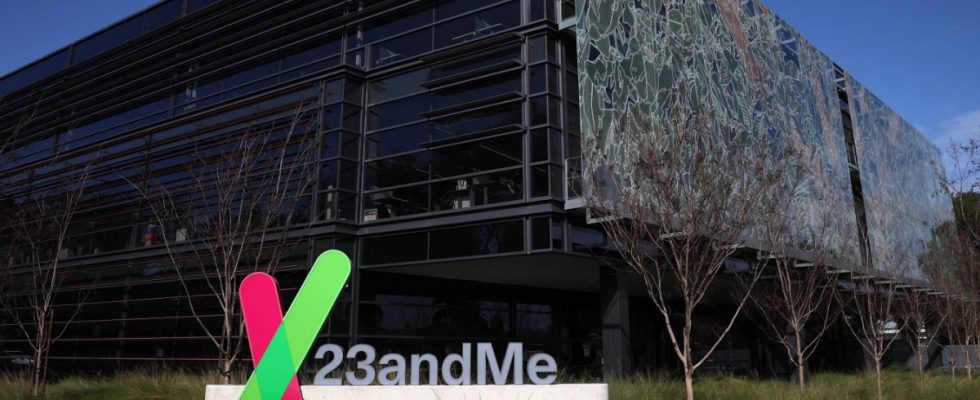If someone had carried out the basic DNA test at the start-up 23andMe shortly before the IPO in June 2021, the result would have been undoubtedly: unicorn. Founder Anne Wojcicki, born in Palo Alto as the daughter of a Stanford professor and 100 percent a child of Silicon Valley even without a DNA test, had created an interesting company; one that people liked to talk about at parties – and, in contrast to many other Silicon Valley unicorns, almost exclusively positive: “Oh, you have southern genes in you? More than ten percent? How exciting! And what are they company should do to fight cancer and Alzheimer’s? Have you also done this test of the health risks? No? What a shame!”
This extended test costs twice as much, and this is exactly what the company would have needed to do to recognize that there were some risks for this unicorn – which are now clearly visible and have caused the share price to crash. At its best in 2021, 23andMe was valued at six billion dollars, currently only two percent of that: a share is worth 73 cents, which is why the US stock exchange Nasdaq issued a warning in November: If the value does not rise to more than one dollar within 180 days, the paper will be delisted from the stock exchange. Wojcicki, who was married to Google-Green Sergej Brin from 2007 to 2015 and whose sister Susan was boss of from 2014 to 2023 Youtube has been, so still has a little more than three months left.
But there’s more to it than that: the company is currently processing a hacker attack in which data from 6.9 of its 14 million users was stolen, and increasingly that of customers whose ancestry Chinese or Ashkenazi Jewish included. It took more than five months for 23andMe to even notice the attack. There are almost 40 class action lawsuits against the company.
The hype was huge
The business model: The hype was huge when talk goddess Oprah Winfrey praised the tests, entertainer Lizzo belted out the lyric “I just took a DNA test, turns out I’m 100% that bitch” in the song “Truth Hurts” and joined in Halloween 2019 disguised as a DNA test, and after comedian Eddie Murphy was the subject and company in the satirical show Saturday Night Live had dedicated a five-minute sketch. “It was interesting because of the information about ancestry, it was an icebreaker at parties,” says tech investor Bruno Bowden, whose statement also includes: It wasn’t much more than that.
If you want to find out information about your own ancestry, you can take this test once in your life and pay a one-time fee of $100. Even the one that is twice as expensive and contains health information such as hereditary diseases is not a reason for a subscription. Saturation is quickly reached when the hype dies down – which is why it was clear early on: 23andMe is as much about lineage as Facebook is about connecting people.
It’s about the data and its monetization, and the idea still sounds very tempting: customers receive information about drug intolerance and cancer risk, 23andMe is allowed to pass on the data to others – around 80 percent of customers agreed to this – to research new drugs and the fight against diseases such as Alzheimer’s or cancer. Wojcicki, 50, wanted to turn a small-talk company into one that would be mentioned in serious debates about health. She told that Wall Street Journal: “It’s harder than we thought. But I don’t think we’ve followed through on what our vision really is.”
Things could get worse
This transformation from DNA startup to healthcare company is one that requires time and money; two things that 23andMe doesn’t have much of – and because of the hacker attack, things could get even worse, because: Hardly anything shakes the trust of customers more than a company being attacked by a hacker in an unofficial forum five months after the first attack himself finds out that he has been attacked – and that the data has already been sold on the dark web for two months.
According to a class action lawsuit submitted to the SZ, a hacker who called himself “Golem” accessed the data of around a million people of Jewish descent on October 1 last year BreachForums published; a forum that is also used by cyber criminals. To see: name, address, date of birth. Shortly afterwards, at the request of a user named “Wuhan”, the hacker posted the data of 100,000 people of Chinese descent – and announced on October 17th that he had accessed data in the wake of the explosion at the Al-Ahli Arab Hospital in Gaza from people whose rich families serve Zionism. It was then that the hacker attack took on a political dimension. “The geopolitical situation and the social climate increase the risk,” the lawsuit states.
There are three dozen of these class actions. On Wednesday, 23andMe representatives met with 20 lawyers because the company wants to consolidate the lawsuits into one and reach a settlement. A decision on this is unlikely to be made before March. 23andMe is still a popular topic of conversation at parties – but it’s more about who was affected by the hacker attack and who might join which lawsuit. And about the fact that the current DNA test from 23andMe is likely to show a unicorn in mortal danger.

